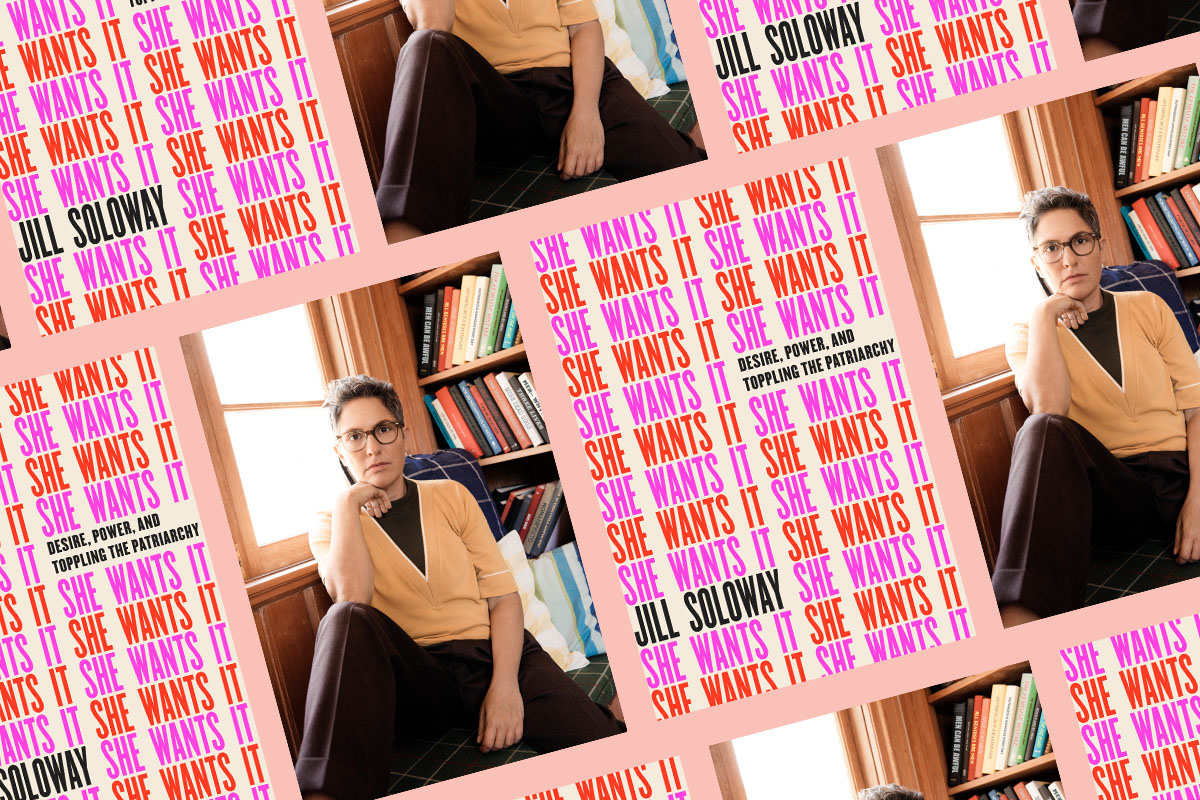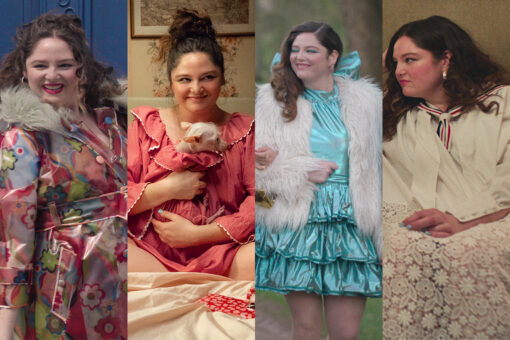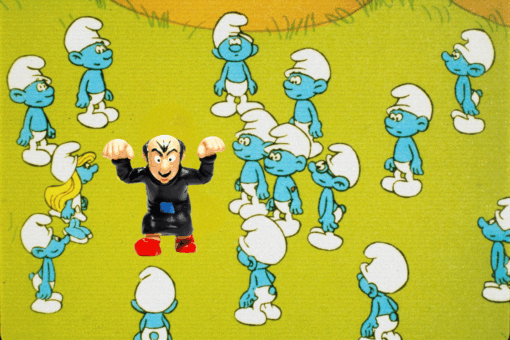When their parent came out as transgender in 2011, Jill Soloway’s life changed. They ended up pitching and creating Transparent, the beloved award-winning TV show from Amazon Prime. But Soloway was a different person in 2011: still identifying as female and married to a man.
Now, in 2018, Jill is non-binary (using they/them pronouns) and proudly queer. Their new book, She Wants It: Desire, Power, and Toppling the Patriarchy, tracks Jill’s journey from when their parent came out as trans, through making Transparent, to, yes, the Jeffrey Tambor #MeToo story. The memoir weaves in Jill’s musings on identity, Jewishness, feminism, and consent. “Women need to be free to want things,” Jill told Alma. “Yet, women are shamed for having desire. Basically, female desire equals shame in the eyes of the patriarchy.”
Following the recent news that Transparent season 5 will air as a two-hour musical movie, Soloway told The New York Times, “It will hopefully feel like ‘Jesus Christ Superstar’ mixed with ‘La La Land’ mixed with ‘Flight of the Conchords’ with something more Jewish thrown in…A little ‘Yentl.’”
We had the opportunity to speak with Soloway about their memoir, Transparent‘s journey to Israel in season 4, and so, so much more.
A large part of your memoir talks about your journey to understand who you are, and as part of that, your pronouns and gender identity changes. So why did you go with the title, She Wants It?
Right, you mean instead of “they want it”? Or “She wanted it”?
Yeah.
I go back to [this] moment in my early 20s, where I had an idea for a documentary called “She Wants It.” When I found that proposal in my trunk of stuff, I was like, holy hell, I’ve been thinking about this crap for 25 years. What is my problem!
When [I decided] to call this book that, even though I don’t necessarily use that pronoun anymore, I started to really think about this idea. Two men looking at a women that they’re slut shaming use the phrase “she wants it” or “she wanted it” as an insult. But, women becoming artists, directors, writers, have to want things. And so, it’s [become] a compliment, from another women, when they’re saying, “Oh god, she really wants it. She wants this job, she wants this directing gig.”
I love the idea of how, as an artist, we’re constantly trying to remind ourselves how to want things; how to want a big audience, how to want a big voice, how to want that camera, how to want a particular actor or a set decoration or whatever you’re doing when you’re creating. Yet, you look back at where we come from, and we see that those words, the idea of “she wants it,” can be used as an insult, or even an excuse to rape somebody. I thought the inherent conflict in this notion deserved continued investigation.
What made you decide to write She Wants It now?
I was starting to think about writing this book as I was selling Transparent, and I actually wasn’t positive that I wanted to write a book. I love writing prose, but part of me [thought] I should just stay in the TV business. I have this beautiful, big family who’s acting out my stories, why do I need to also tell “the story behind the story behind the story”?
I had been ambivalent about it because I feel really lucky that I got to have the Pfeffermans as this kind of public voice. But as I started to move from identifying as femme to identifying as non-binary – along with this journey of claiming my creativity — I just started to notice the ways, for me, my femininity inhibited my ability to know whether or not I was consenting in my youth. Femaleness in patriarchy means that you’re always kind of stepping around the power of men. And so, women are really careful not to enrage a man.
There are super specific ideas about gender and consent that obsess me. And this memoir is, for me, an opportunity to have some of those conversations cloaked within the juicy memoir.
One thing that stuck out to me was the strength of your relationship with your sister, Faith. How has your relationship with Faith evolved over the years?
I feel so lucky to have her. I feel like when we were kids, just being little and having that unconditional positive regard of a sibling and that unconditional love, playing around the house — for me, that’s the blueprint for creativity. [I try] to reignite that feeling with my professional collaborators of like, okay, we’re just kids, we’re just playing, none of it matters, we’re just supposed to entertain each other and ourselves.
So, that relationship [with Faith] gives me the blueprint for all that — we’re still best friends. We talk all the time. And she’s coming with me on the book tour. She’s going to play piano at some of my gigs on the tour, and we’re working on season 5 of Transparent together right now, so she’s still my right-hand man in every possible way.
In making Transparent, you wrote, “I finally had a script about an unlikeable Jewish chick — but it turned out I needed a man to play her to get it made.” You later write about how the pilot probably wouldn’t have been made without someone of Jeffrey Tambor’s stature. Can you talk me through the realization you had that Maura had to be played by a male actor?
It didn’t really occur to me to cast a trans woman, like I think my politics at that point were so dumb that it didn’t even occur to me.
When I was [pitching] Transparent, I can’t believe I was so scared. I didn’t think I could make TV show. [But then I thought] wait a minute, I’ve been writing pilots about families like this, about women like this, for so many years, and they never, ever, ever got made. So why is it that the powers that be wouldn’t want these unlikeable women having their voices? I sort of looked at all the TV executives of the world [and thought], they don’t want women to be like that. But, if they can have Jeffrey be that, they’ll tune in, you know? And there were so many things that were unfair about Jeffrey playing that role. I mean, he was amazing at it, but…
All in all, when all was said and done, the trans community really felt like having a cis man in the role of a trans woman was still problematic, and I understand that.
How has your personal journey impacted the Jewishness of the Transparent characters?
Everything that happens on Transparent is a little bit interconnected. So when Sarah was doing Hineni, I was working with a group of people called East Side Jews. And the musicians that played the havdalah event at Hineni are the musicians that play at the High Holidays events that I go to. So, it’s really cool — the show has [allowed me to] loop in the things that are happening in my real life into the show.
(Ari Herstand was one of the four band members in Season 3, Episode 5 of Transparent that focused on Hineni.)
How do you explore your Judaism on the show?
The show is a big opportunity to have fun exploring the things you feel in real life. One of the best things about Transparent, actually, is that it has this family and has this window where I can explore these things about Judaism and gender in a way that kind of welcomes in an audience, like with comedy, and make it sexy and make it queer. It’s been the most amazing cast, most amazing talent, and [more than] I could ever imagine in terms of artistic freedom and access and audience.
I didn’t really answer your question about my own journey cause I feel like, yeah, I have the same sense of yearning and longing that the Pfeffermans do. I wish I was more Jewish and I wish I did more but at the same time, Judaism is really important to me.
How has the reaction to the Jewishness of the show been in places other than New York and LA?
People love it. I think a lot of writers feel like specificity is such a good tool. So even if people are watching it and they’re Latino or Greek or Middle Eastern, they’re like, “They act just like my family.” I think people like the specificity.
In the memoir, you write about the difficult decision you made in not filming season 4 in Israel. What was it like deciding to film season 4 in Los Angeles instead of going to Israel?
We really, really wanted to be [in Israel] and to have the cast there. I wanted to film in Palestine and I wanted to film at the Dead Sea. I just really felt like the experience of the doing it would create a film record that could not be recreated in LA. And then I kind of gave up my dream.
It’s so funny the book is called She Wants It, but what does it mean when I really, really, really want something and I can’t get it? I really, really, really, really, really wanted to bring the whole cast to Israel. Like, I wanted it so badly. And I was so upset when I couldn’t figure it out. And then, I watched season four and it looked amazing and it turned out great and that would’ve been a lot, getting everybody down to the Dead Sea. I think people watch it and they feel like the Pfeffermans were at the Dead Sea and at the Wailing Wall.

But, that was the case where I didn’t get what I wanted, and I actually think in retrospect, it was probably better.
Why was it so important to you to go Israel and Palestine?
I was fighting, like, we’re going to go shoot in Ramallah, we have to go shoot in Ramallah, I was like monologuing. A lot is not in the book actually. The whole end of the book was really about Israel and about “the third path,” about looking for a way through and trying to compromise between my queerness and my Judaism. That was really the end of the book, before Trump was elected and before the reckoning happened.
So why did Israel not end up as the end of the memoir?
Israel was the end of the book. And then, when everything started happening with the fall of the patriarchy, I [thought], woah, wait a minute, now this is in the end of the book. And in fact, the fall of the patriarchy as the end of the book is probably much more connected with my themes of consent that I’ve been haranguing on about for years. So, the book kind of got this ending in the last year.
I kind of realized all the Israel stuff was a bit of a false ending. When we were doing the Israel stuff [on Transparent], I thought we were going to make some real enemies. You know, that Jews were going to be mad about the things we were saying about BDS, and that the queer activists were going to be made about the ways that Shelly was acting like Israel belongs to Jews as sort of a Holocaust reparation. So I thought we were saying these things that were really, really going to piss people off and I was really, really scared.
I think people felt like [the season] covered a bunch of different ways of looking at the conflict; people felt like it was fair, and I wasn’t personally targeted. I really somehow thought that I was going to end up in a sort of social media mess. And it turned out fine! Nobody cared! I mean, people loved the season, but I certainly didn’t get in “trouble” in any kind of way.
Had you known things would’ve been fine, do you wish you would have done anything differently in planning the season?
No, I mean I love the season and I loved the way it turned out. I don’t think I would’ve done anything different. I guess I wish I wouldn’t have been so panicked.
I felt like we needed to be a delegation, and our cast and our show needed to find this third way. I wanted to be able to say, “Yes, we can go shoot in Tel Aviv, and yes we can also go to Ramallah. Yes, we can stay at a hotel in East Jerusalem.” I really wanted to live the non-binary possibility. I thought we had to put our bodies, and put our production, where our mouths were. But, we didn’t. I didn’t.
Just because I want something, just because it seems like something we have to do, I don’t think it means I have to do it. I’m learning how to handle my desires with a little bit more patience.
What was it like visiting Israel after shooting the season?
I’m so glad I went. Because we were portraying it, and I wanted to have it feel authentic. When you cross over at the Kalandia checkpoint, and then you’re in Ramallah, it’s like going into a different country, in terms of just what life feels like. There’s a lot of people protesting in the streets, and there’s also really lovely cafés. I think that, to me, was the most shocking. In my mind, Palestine was far away, and it took a long time to get to. But the proximity of Ramallah to the life in Israel that a lot of Israelis take for granted [was] just crazy.
What’s one thing you wish people knew about you?
I guess that a lot of the things I say… I think, when people hear me saying them or know me saying them, they realize that I’m saying them with a little bit of a wink. Then, sometimes, when [the words are] in print, people are like, oh wow, she’s really harsh. Or, they’re really tough. I think when my words are in print, people get a little bit scared.
What I really want people to know is I love the idea of hashing through ideas together, so I float a lot of the notions as a way to welcome people into the question, which is very Jewish, instead of throwing [ideas] down. I’m not trying to be incendiary, I’m trying to ignite people’s interests in moving into a new arena of thought, with love.
This conversation has been edited and condensed.



